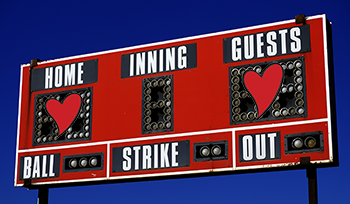By Shawn McAndrew
 My dad was a score keeper – someone who made darned sure he was never deficient in returning a favor, and made sure he got even if he was wronged. As a good daughter – and in the tradition of negative love – I became a score keeper, too. I could never let anyone do something for me without returning the favor. I normally wouldn’t let someone do something for me in the first place, but if they caught me off guard and did something nice, I would make sure not much time passed before I evened the score. I also kept a tally of wrongs done to me.
My dad was a score keeper – someone who made darned sure he was never deficient in returning a favor, and made sure he got even if he was wronged. As a good daughter – and in the tradition of negative love – I became a score keeper, too. I could never let anyone do something for me without returning the favor. I normally wouldn’t let someone do something for me in the first place, but if they caught me off guard and did something nice, I would make sure not much time passed before I evened the score. I also kept a tally of wrongs done to me.
Keeping Score Is Exhausting
Keeping score is exhausting! It kept me from having too many close friends, or friends in general, because who can keep track of good deeds if you have dozens of friends? It also kept me ever vigilant, trying to make sure I reciprocated appropriately. The other aspect of this is that if I did something for someone, I wanted them to reciprocate in turn. If they didn’t, bad feelings arose (vicious cycle, anyone?).
Fortunately, I have a very good friend who, years ago, stopped this behavior in its tracks. Details aren’t important, but the results are. I began to understand how ludicrous it was to tally every deed. After doing the Process, I understood the heritage of keeping score, and why it didn’t serve me anymore. Thank goodness!
Good Deeds Are Love
Doing good deeds for another is a heart thing, a love thing. It is a human thing. There are times when we need to be held, and other times when we can hold. Parents sacrifice for their children, not because they expect their children will one day sacrifice for them, but because they want the best for their children. Friends do good things for friends out of love. Siblings take care of each other because they’re family. Strangers help out strangers because some day they may have to depend on the kindness of strangers (thank you, Blanche!).
Random Kindness
Years ago, someone started a movement called Practice Random Kindness and Senseless Acts of Beauty (attributed to Anne Herbert in 1985). People began doing anonymous good deeds, just for the pure joy of being able to give without getting. Long before electronic payment became the way to get through the toll booth, someone at the front of the line could pony up the toll for the cars behind them. What a surprise to drive up to the toll taker, money dangling from my hand, and be told my toll had already been paid. There was no way to repay the benefactor. I could only pay for the person behind me, if I chose.
We need more random kindness and senseless beauty. Let’s not keep score, either, unless it’s for your child’s basketball team, where the players are just trying to learn how to be part of a community of support. Love more; laugh more; reach out more. As they say at the beginning of a tennis match, the score is love-love.